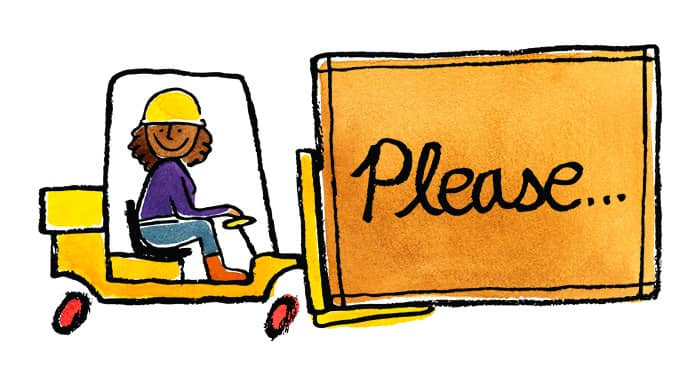
These days, it’s challenging to not offend someone.
With the rise of technology, employees and job seekers can easily use photos, videos and screenshots to call you out for saying or doing the wrong thing. It’s like Miranda Rights for the modern workplace…“anything you say can and will be used against you — and spread all over social media”.
People are understandably more anxious about their words and actions — especially around candidates, colleagues and bosses. But that doesn’t mean “strictly business” is the only way to go.
While we could all stand to be a bit more intentional about the things we say and do, the truth is, people need to have fun at work. The secret is to create an attractive working culture, free from both the painfully outdated -isms and the fake-it-till-you-make it positive thinking BS.
You Can’t Force People to Be Positive
Sometimes optimism can do more harm than good.
While positive psychology absolutely has its merits, the claim that positive thinking leads to a happy life has come under intense scrutiny.
Barbara Held is a professor of psychology at Bowdoin College and the author of Stop Smiling, Start Kvetching: A 5-Step Guide to Creative Complaining. Barbara refers to society’s overemphasis on optimism as “the tyranny of the positive attitude”. She says, “By TPA, I mean that our culture has little tolerance for those who can’t smile and look on the bright side in the face of adversity.”
We can’t force people into being optimists. And many people will resent you for trying. 🙄
In fact, Julie Norem, a psychology professor at Wellesley College, studies a unique group of people who respond better to negativity than positivity — she calls them “defensive pessimists”. These individuals handle their anxiety by thinking about everything that could go wrong and in doing so, are able to avoid those drawbacks.
It’s time to stop making people feel guilty for not always being able to see the sunny side.
Quality candidates are great at sniffing out the BS. We all know that work gets hard. Don’t pass on top talent just because you don’t know how to release the pressure when the going gets rough.
Here’s How to Create a Great Culture without Forcing It:
Call Each Other Names
One good example is Sprout Pharmaceuticals, founded by Cindy Whitehead. In her recent interview on The Tim Ferriss Show, Cindy shares how she and her employees give each other sarcastic nicknames. Once given a title, they’ll never be known for their real names again. And no one gets to veto their own name — not even her.
From cute little monikers like “spoon” to crazy aliases like “duck balls”, each nickname connects the person to their story. Plus, it’s fun.
This is just one example of how you can give your people permission to be themselves while encouraging them to celebrate each other’s quirks. The end result is that locked-arms, us-against-the-world kind of culture great candidates can’t wait to be a part of.
And remember to let your employees take the reins. It’s one thing when HR tries to prod or train people into a state of perpetual smiles. It’s another when the folks on the frontline are rooting for each other. In fact, research from HR guru Josh Bersin shows that companies with a “recognition-rich culture” had 31% lower voluntary turnover rates.
Find Humor in Dull Places
Most people think of humor and work like oil and water.
But it’s more like chocolate and peanut butter. 😋
In his TEDx talk, award-winning speaker and author of the best-selling book 501 Ways To Use Humor At Work, Andrew Tarvin disproves the “no jokes at work” myth in less than 12 minutes flat.
As an intern at Procter & Gamble, Andrew had his sights set on a full time role. The night before his presentation to the review board, he realized his PowerPoint slides were painfully boring. So he scrapped it and started from scratch…in Microsoft paint.
Now, FMCG powerhouses like P&G are famous for their efficiency-obsessed cultures. And creating an entire presentation in Microsoft paint is anything but productive. But as Andrew says, “Just because something saves time, it doesn’t mean that it actually gets results.”
In the end, Andrew’s stick-figure representations won him the job.
Moral of the story? Don’t be afraid to laugh a little. Happy employees are 12% more productive. And although we’ve all been trained on how to do our jobs, how many of us have been taught how to enjoy them?
Know Where to Draw (and How to Walk) the Line
Humor is important for letting the air out and building the kind of harrowing emotional resilience that will get your people through the greatest of business hurdles.
But remember, balance is important. As is relevance.
According to research conducted by Gang Zhang, a postgrad student at London Business School, if bosses want to tell jokes, they better know their delivery. Constantly cracking bad jokes can be bad for morale. 🤦
Make an effort to get to know the people you work with so your humor doesn’t backfire. And ALWAYS make sure you and the entire team are crystal clear on the company values. Contrary to popular belief, having hard boundaries to work within makes you more creative, not less.
By mixing transparency, fun and a bit of irreverence, you can create a winning culture that employees and candidates will love. Just make sure you know your limits. 😉





